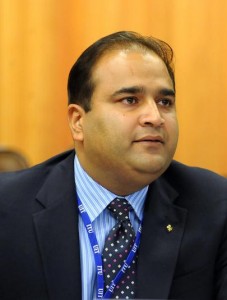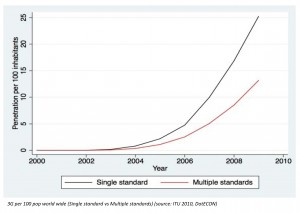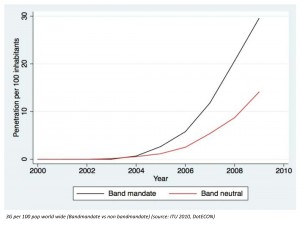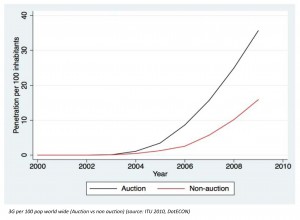
 1 Mandating single technology Standard: Countries reach 50{e1f18614b95d3cd6e4b3128e1cd15d99b042a60a5a19c19b7a8e07e7495efa10} penetration (peak adoption rate) more quickly when they mandate a 3G single technology.
1 Mandating single technology Standard: Countries reach 50{e1f18614b95d3cd6e4b3128e1cd15d99b042a60a5a19c19b7a8e07e7495efa10} penetration (peak adoption rate) more quickly when they mandate a 3G single technology.2 Band neutrality: Limiting 3G to a single frequency band promotes faster roll out, but in the long run can slow down the growth.
3 Auctions: Using auctions rather than other methods to allocate spectrum helps countries to reach 50{e1f18614b95d3cd6e4b3128e1cd15d99b042a60a5a19c19b7a8e07e7495efa10} penetration earlier.
 Regulators can either mandate a technology for a specific generation of cellular service or let the operators decide. Compatibility resulting from a single standard can lead to economies of scale for operators and equipment vendors. Early diffusion is therefore slower in countries with multiple standards.
Regulators can either mandate a technology for a specific generation of cellular service or let the operators decide. Compatibility resulting from a single standard can lead to economies of scale for operators and equipment vendors. Early diffusion is therefore slower in countries with multiple standards.Hence countries with multiple standards for a telecom generation were about 9 months later to reach the 50{e1f18614b95d3cd6e4b3128e1cd15d99b042a60a5a19c19b7a8e07e7495efa10} penetration rate than the counties with single standards although the growth rate in multiple standards country is higher than the single standard counterparts. It can be argued that single standard can hinder development of alternative technologies. However, stimulating new technology development may be less important than reaching high penetration in countries without an indigenous cellular infrastructure-manufacturing sector.
 Regulators can either mandate a specific band for a specific technology or let the operators upgrade or refarm their already acquired bands. It is commonly argued that a band mandate enhances global roaming and ensures economies of scale. Nonetheless, it forces the operators to go through the spectrum award process to introduce new technology even though they might be capable of reusing their existing spectrum. Therefore mandating the band helps the countries to reach the peak adoption rate earlier. This is because the operators can use the new band for the new technology while serving the existing customers with older spectrum.
Regulators can either mandate a specific band for a specific technology or let the operators upgrade or refarm their already acquired bands. It is commonly argued that a band mandate enhances global roaming and ensures economies of scale. Nonetheless, it forces the operators to go through the spectrum award process to introduce new technology even though they might be capable of reusing their existing spectrum. Therefore mandating the band helps the countries to reach the peak adoption rate earlier. This is because the operators can use the new band for the new technology while serving the existing customers with older spectrum.Regulators in general prefer auctions to any other spectrum award methods. Auctions are faster in comparison with hearings, which might take months or years. They largely ensure transparency and ensure that the party that values the spectrum most gets the spectrum. This has a significant effect on ensuring high adoption rate. The capital debt caused by auctions might act as an incentive for fast roll-out to earn revenue to cover the debt. Consequently the auctions as the award process do help the countries to reach peak adoption rate faster affirming the hypothesis.
The countries that conducted auctions were at least 7 months earlier than their counter parts to reach 50{e1f18614b95d3cd6e4b3128e1cd15d99b042a60a5a19c19b7a8e07e7495efa10} penetration rate. Still the estimation does not find the effect of award process significant on growth parameter. The finding indirectly supports the hypotheses that auction bid prices are “sunk-cost” and have little effect on the ultimate rollout of the technology.











